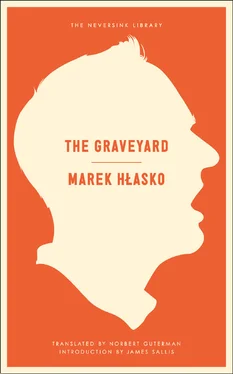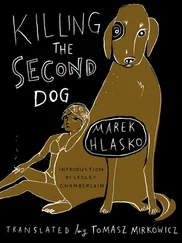“O Polish woods, why do we love you so?
Because in your thickets we feel we’re in heaven.
Under your wings
We aim our rifles safely at the foe …”
Some men in overalls on their way to work laughed loudly and stared at him. This angered him so much that he too stopped.
“What the hell’s the matter?” he cried. “You think I’m drunk or something?”
The others went by, but Franciszek kept shouting: “You think I’m drunk? Like hell I’m drunk! It’s a lie. You’re drunk yourselves …”
Suddenly he saw two policemen before him. They were looking at him coolly and attentively. Franciszek wanted to say something, but he was still thinking of the workers who had offended him, and, instead of apologizing, cried once again, “You’re the ones that are drunk!”
The policemen took a step toward him, and Franciszek, suddenly sobered, saw their faces close up. They were young, one a corporal, the other, with three stripes, a sergeant. The sergeant was very freckled and had a turned-up nose, and it seemed to Franciszek that his blue eyes held a cold threat as they looked at him from under the metal-edged visor of his cap.
“May we see your papers, Citizen?” asked the sergeant.
He extended his hand stiffly, and Franciszek stepped back.
“My papers?” he stammered out, taken by surprise. “What for?”
“Your papers, please,” the sergeant repeated, and his voice sounded a little louder than before.
Franciszek put his hand in the pocket where he kept his wallet, but on touching the cold leather he stopped. “But—” he began.
Then the other policeman, who until then had been standing motionless and silent, alertly watching Franciszek’s every move, thrust his face at him and cried: “Your papers. Do you understand? Or don’t you?”
Franciszek drew out his wallet. He opened it with trembling hands, and gave his papers to the sergeant. The latter examined them, then pressed his leather bag against his knee and began to write something in a greasy little notebook with a black oilcloth cover.
“May I ask what you are writing?” Franciszek said, trying to look over the sergeant’s arm.
The sergeant did not answer; he found it difficult to write in such an uncomfortable position, and Franciszek saw him knitting his brows and sticking out the tip of his tongue. After a moment he asked again: “Why are you taking down my name?”
“What’s the matter, don’t you like it?” the corporal asked sharply. “Maybe you don’t like the police, Citizen?”
“I haven’t said anything of the kind,” Franciszek replied, just as sharply. He looked at the corporal’s chubby face, and felt himself begin to shake with anger. By now the effects of the liquor had entirely left him.
“You’re not saying it now,” the corporal said, and his childlike mouth twisted into a malicious smile. “Of course you’re not, now. But a moment ago you said the police were drunks.”
“Who? Me?”
“No. Mrs. Malinowska.”
“Come on, now. Don’t take that attitude,” Franciszek said indignantly.
“Now it’s our attitude you don’t like. But a minute ago you had the nerve to call us drunks.” He looked at Franciszek with superiority and said distinctly, “You’re insulting the uniform, Citizen.”
“It’s a lie!” Franciszek cried heatedly.
The corporal turned to the sergeant, who all this time had calmly been writing in his black notebook. “Did you hear that? This citizen says we’re liars. Take that down.”
Franciszek looked again at their young faces, and was overcome with rage. Raising both arms, and shaking them fiercely, he roared: “Take it down, you stinker, take it down! And take down that you can stick it all up your ass, and that I s— on everything …”
He was beside himself with fury. His own words came to him as through a fog; he could neither understand nor distinguish them. He shouted incoherently, desperately waving his arms. When his rage had passed, and he came to, he saw that the sergeant was putting his identification papers into his own leather bag.
“Let’s go,” the sergeant said dryly.
And, quite helpless, Kowalski went with them to the nearby police station.
THEY WALKED LESS THAN TEN MINUTES, AND during that time Franciszek, whose strength had completely evaporated after his fit of rage, gradually recovered his composure. After a while he decided to put a good face on it, and even began to whistle a tune. He assumed an attitude of injured innocence. He held his head high, strode along with assurance, and once, when he stumbled and noticed the quick glance of one of the policemen, he smiled with ironic superiority. When they entered the long dark passageway leading to the police station, he thought: “There was no need to fly off the handle. It was all because I was too tired and drank too much. Vodka is really a gift of the devil. I’ll never get anywhere with these stupid kids. Maybe I really did make an ass of myself. I must talk to someone sensible.”
They crossed a small courtyard and entered a room where there was a man on duty. Their entrance took no more than a moment, but it made Franciszek feel ill at ease for the first time since the incident in the street. First the younger policeman opened the door, then stepped back, and only after Franciszek had entered did the two policemen follow, closing the door behind them. The door made a particularly unpleasant squeak. “A fine state of affairs,” Franciszek thought. “The one place where things should run smoothly; they might have oiled it. If only I could talk to someone sensible now.”
He looked about him attentively, his face still impassive. It was an unpretentious room, with walls of a nondescript color, the room itself divided in two by a railing. Near the middle of the railing the paint which had once covered it was rubbed off; Franciszek thought that this must be because so many “customers” had leaned against it. On the walls hung portraits of government officials, and above them the Polish eagle. A wooden bench stood by one of the walls; a man was asleep on it, his back turned to the room. “You wouldn’t say this place was very well run,” Franciszek thought once again, and the thought gave him a kind of malicious satisfaction.
Meanwhile the policemen were behaving as though Franciszek did not exist. They were talking in an undertone with a man seated behind the railing. Franciszek heard his nasal voice but could not see his face, which was hidden by the backs of the policemen. For a minute or so he did not move, expecting to be asked to step up and make a statement, but nothing happened. Then, after listening awhile, Franciszek realized that they were not talking about him, but about a bicycle that had been reported stolen a week earlier. One of the policemen maintained that the thief was a certain Pasterka; the other, that the bicycle owner had sold it to pay for his drinks, and was afraid to admit it to his wife. “Damn the whole business,” Franciszek thought. “If that’s the way they’re going to act, I’ll tell them what I think of all this.” He moved closer to the railing and saw that the policeman seated at the desk was also a mere corporal. This took him completely by surprise; he had thought that the men who had brought him here were talking with a lieutenant.
“I beg your pardon,” he said loudly, moving to the middle of the room. “Could I speak to the chief?”
The policemen went on talking with the seated corporal for a while, then turned toward him.
“I’d like to speak to the chief,” Franciszek repeated.
“Oh, yes,” said the sergeant. He turned to the corporal at the desk. “I suppose we’ll put this citizen in temporary. How are things in there today?”
Читать дальше






![Ричард Деминг - Whistle Past the Graveyard [= Give the Girl a Gun]](/books/412176/richard-deming-whistle-past-the-graveyard-give-t-thumb.webp)


